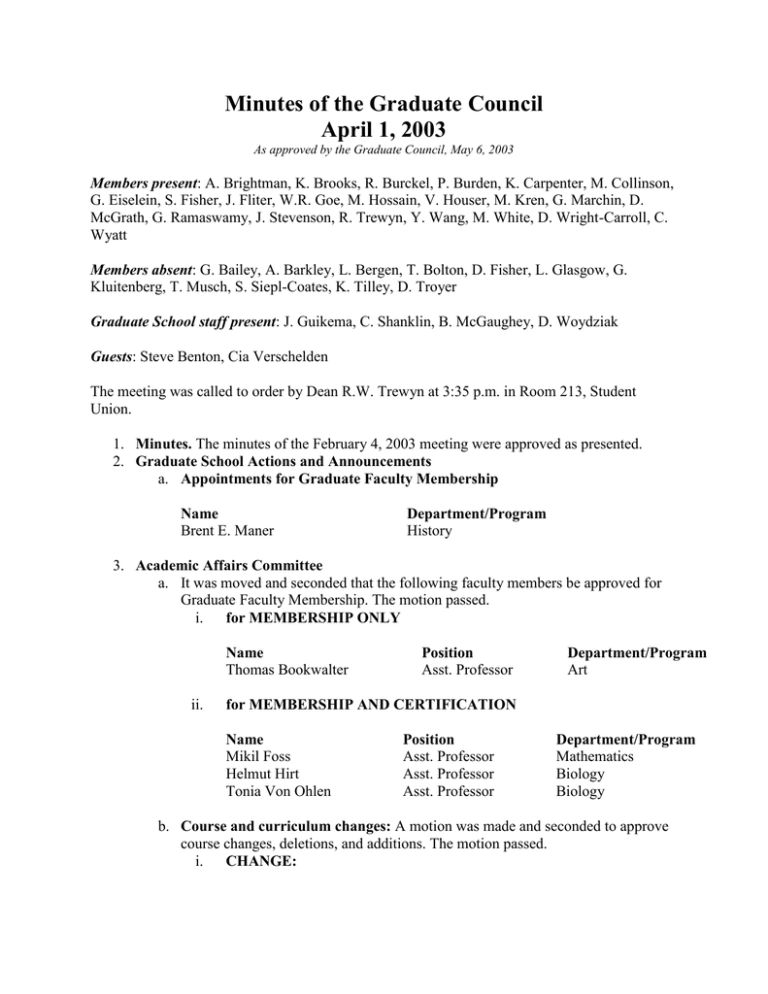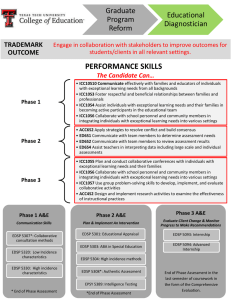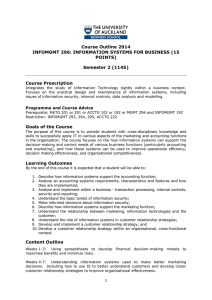Minutes of the Graduate Council April 1, 2003
advertisement

Minutes of the Graduate Council April 1, 2003 As approved by the Graduate Council, May 6, 2003 Members present: A. Brightman, K. Brooks, R. Burckel, P. Burden, K. Carpenter, M. Collinson, G. Eiselein, S. Fisher, J. Fliter, W.R. Goe, M. Hossain, V. Houser, M. Kren, G. Marchin, D. McGrath, G. Ramaswamy, J. Stevenson, R. Trewyn, Y. Wang, M. White, D. Wright-Carroll, C. Wyatt Members absent: G. Bailey, A. Barkley, L. Bergen, T. Bolton, D. Fisher, L. Glasgow, G. Kluitenberg, T. Musch, S. Siepl-Coates, K. Tilley, D. Troyer Graduate School staff present: J. Guikema, C. Shanklin, B. McGaughey, D. Woydziak Guests: Steve Benton, Cia Verschelden The meeting was called to order by Dean R.W. Trewyn at 3:35 p.m. in Room 213, Student Union. 1. Minutes. The minutes of the February 4, 2003 meeting were approved as presented. 2. Graduate School Actions and Announcements a. Appointments for Graduate Faculty Membership Name Brent E. Maner Department/Program History 3. Academic Affairs Committee a. It was moved and seconded that the following faculty members be approved for Graduate Faculty Membership. The motion passed. i. for MEMBERSHIP ONLY Name Thomas Bookwalter ii. Position Asst. Professor Department/Program Art for MEMBERSHIP AND CERTIFICATION Name Mikil Foss Helmut Hirt Tonia Von Ohlen Position Asst. Professor Asst. Professor Asst. Professor Department/Program Mathematics Biology Biology b. Course and curriculum changes: A motion was made and seconded to approve course changes, deletions, and additions. The motion passed. i. CHANGE: ACCTG 642. Accounting Research. (3) I, II. Use of the sources of authoritative guidance in resolving complex, professionally oriented problems in financial, governmental, and tax reporting. Analysis and presentation of casematerial is covered. Pr.: ACCTG 342, 433, and 442. (Note: Students may be enrolled concurrently in ACCTG 442.) ACCTG 642. Accounting Research. (3) I, II. Use of the sources of authoritative guidance in resolving complex, professionally oriented problems in auditing, financial reporting, and tax reporting. Analysis and presentation of casematerial is covered. Pr.: ACCTG 342, 433, and 442. (Note: Students may be enrolled concurrently in ACCTG 442.) For accounting majors only. ACCTG 844. Advanced Accounting Information Systems. (3) II. An in-depth study of accounting information systems focusing on current means of capturing, storing, processing, and retrieving accounting data. Important issues include: designing data base structures for control, access, and auditability; design and analysis of the system controls found in complex EDP systems, decision support, and expert systems in accounting. Pr.: ACCTG 331. ACCTG 844. Design of Accounting and Business Information Processes. (3) I. This course focuses on understanding and designing contemporary business and information processes in organizations, providing and introduction to database systems, project management and information systems controls and technology. Pr.: ACCTG 810, MANGT 830 and instructor permission for MBA students or ACCTG 331 for Masters of Accountancy students or instructor permission. ACCTG 845. International Accounting. (3) II. An examination of comparative international accounting systems, efforts to harmonize accounting standards internationally, problems of international financial analysis, and accounting issues of particular relevance to U.S. multinational enterprises. Pr.: ACCTG 641 and ACCTG 731. ACCTG 845. International Accounting. (3) On Sufficient Demand. An examination of comparative international accounting systems, efforts to harmonize accounting standards internationally, problems of international financial analysis, and accounting issues of particular relevance to U.S. multinational enterprises. Pr.: ACCTG 641 and ACCTG 731. EDCEP 829. Learning Principles. (3) On sufficient demand. Exploration of learning theories with emphasis on the application of psychological principles to the teaching-learning process, as a basis EDCEP 829. Learning Principles. (2-3) II. Exploration of learning theories and an overview of research on factors that enhance academic performance, including psychosocial variables, learning styles, and for examining and understanding contemporary research in teaching effectiveness. Pr.: EDCEP 315. learning strategies. This course covers strategies for enhancing student academic performance, ranging from assessment to implementation. Pr.: Consent of instructor. EDSEC 621. Program Planning in Vocational Education. (2-3) I, II, S. The program development and planning process; development of guides for teaching and evaluating reimbursable secondary programs. Pr.: EDSEC 620. EDSEC 621. Program Planning in Career and Technical Education. (2-3) I, II, S. The program development and planning process; development of guides for teaching and evaluating reimbursable secondary programs. Pr.: EDSEC 620. EDSEC 710. Occupational Family and Consumer Sciences. (2) I. Principles and procedures in planning and organizing family and consumer sciences-related occupational programs. The course includes an approved occupational experience in business/industry and consideration of methods and teaching materials peculiar to these programs. Pr.: FSHS 110 and equiv. EDSEC 510. Occupational Family and Consumer Sciences. (2) I. Principles and procedures in planning and organizing family and consumer sciences-related occupational programs. The course includes an approved occupational experience in business/industry and consideration of methods and teaching materials peculiar to these programs. Pr.: FSHS 110 and equiv. EDSP 778. Technology for Special Education. (2) II. Designed to help special educators develop an awareness of technology that can assist in the lives and learning of students receiving special education. Administrative applications of technology related to special education will also be covered. Pr.: EDETC 718. EDSP 778. Technology for Special Education. (3) I. Designed to help special educators develop an awareness of assistive technology (AT) and related legislative guidelines, which can assist in the lives and learning of students receiving special education. This course will explore assistive technology devices and services and software appropriate for students with special needs. Internet resources and AT evaluation systems related to special education will also be covered. Pr.: EDETC 318 Instructional Media or related professional experiences. EDSP 841. Interventions: EDSP 841. Interventions: Moderately Mentally Retarded. (3) II. Curriculum content, methods, and organization of educational programs for children with moderate metal retardation. Pr.: EDSP 724 and EDSP 842 or EDSP 843. Functional Special Education. (3) II. Curriculum content, methods, and organization of educational programs for children and youth with functional special education needs. Pr.: EDSP 724 and EDSP 743. EDSP 848. Transitions in Special Education. (2) S. A study of transition models, curricula, assessment, career development, community resources and agencies, and materials. Pr.: EDSP 710. EDSP 848. Transitions in Special Education. (3) S. A study of transition models, curricula, assessment, career development, community resources and agencies, and materials. Pr.: EDSP 710. EDSP 885. Practicum in Education of Exceptional Individuals. (1-6). On sufficient demand. Observation and participation in teaching exceptional individuals under the supervision of selected teachers in special education. Pr: EDSP 841, 842, 843 or 846. EDSP 885. Practicum in Education of Individuals with Functional Special Education Needs. (1-6). On sufficient demand. Observation and participation in teaching exceptional individuals under the supervision of selected teachers in special education. Pr: EDSP 742, 743, 785, and 841. LAR 645. Professional Internship. (V) I, II, S. Confirmed employment in a professional physical planning office, subject to the approval of the departmental faculty, for a period of eight weeks, documented by the employer and written and oral reports by the students. Pr.: LAR 444. LAR 645. Professional Internship Report. (V) I, II, S. Confirmed employment in a professional physical planning office, subject to the approval of the departmental faculty, for a period of eight weeks, documented by the employer and written and oral reports by the students. Pr.: LAR 444. MANGT 867. Management of Information Resources. (3) II. Concepts and information resource management techniques are integrated into a conceptual framework of business computing systems. The impact of current issues and new technologies on business is emphasized through discussion and application. Topics include Internet, decision support, executive information systems, computer simulations, systems analysis and MANGT 867. Enterprise Information Systems Management. (3) II. Concepts and information resource management techniques are integrated into a conceptual framework of enterprise information systems. The impact of current issues and new technologies on business is emphasized through discussion and application. Pr.: ACCTG 844. design, and implications of recent computing innovations on business. Pr.: MANGT 830. PHYS 562. Introduction to Quantum Mechanics. (3) I. An introduction to quantum mechanics: wave mechanics, one-dimensional solutions, perturbation theory, timedependent perturbation theory, the one electron atom. Pr.: PHYS 522, 551; MATH 240. PHYS 662. Introduction to Quantum Mechanics. (3) II. Topics include solutions to the time independent Schrödinger equation, descriptions of one-electron and multi-electron atoms, electron spin and magnetic moments. Three hours of lec. per week. Pr.: PHYS 325, 522. PHYS 564. Thermodynamics and Statistical Physics. (3) I. An introduction to thermodynamics developed from the concepts of statistical physics. Applications include the gas laws, concepts of heat and work, phase transitions, and kinetic theory with applications to statistical physics. Pr.: PHYS 522; MATH 240. PHYS 664. Thermodynamics and Statistical Physics. (3) I. An introduction to thermodynamics developed from the concepts of statistical physics. Applications include the gas laws, concepts of heat and work, phase transitions, and kinetic theory with applications to statistical physics. Pr.: PHYS 522; MATH 240. PHYS 709. Applied Quantum Mechanics. (3) I. A study of Schrödinger's theory of quantum mechanics and its application to one electron atoms, multielectron atoms, quantum statistics, spectra of molecules and selected topics in quantum excitations of solids, nuclear physics, and elementary particles. Three hours of lec. per week. Pr.: PHYS 562. PHYS 709. Applied Quantum Mechanics. (3) I. A study of Schrödinger's theory of quantum mechanics and its application to one electron atoms, multielectron atoms, quantum statistics, spectra of molecules and selected topics in quantum excitations of solids, nuclear physics, and elementary particles. Three hours of lec. per week. Pr.: PHYS 662. STAT 713. Applied Linear Statistical Models. (3) I. Matrixbased regression and analysis of variance procedures at a mathematical level appropriate for a first-year graduate statistics major. Topics include simple linear regression, linear models in matrix form, multiple linear regression, model building and diagnostics, analysis of covariance, multiple STAT 713. Applied Linear Statistical Models. (4) I. Matrixbased regression and analysis of variance procedures at a mathematical level appropriate for a first-year graduate statistics major. Topics include simple linear regression, linear models in matrix form, multiple linear regression, model building and diagnostics, analysis of covariance, multiple ii. comparison methods, contrasts, multifactor studies, blocking, subsampling, and split-plot designs. Pr.: Prior knowledge of matrix or linear algebra and a prior course in statistics. A student may not receive credit for both the STAT 704/705 sequence and STAT 713. comparison methods, contrasts, multifactor studies, blocking, subsampling, and split-plot designs. Pr.: Prior knowledge of matrix or linear algebra and a prior course in statistics. A student may not receive credit for both the STAT 704/705 sequence and STAT 713. STAT 717. Categorical Data Analysis (3) II. Analysis of categorical data arranged in two and higher dimensional contingency tables using classical methods and log linear models. Various measures of association are discussed. Pr.: STAT 704, 705. STAT 717. Categorical Data Analysis (3) II. Analysis of categorical count and proportion data. Topics include tests of association in two-way tables; measures of association; CochranMantel-Haenzel tests for 3-way tables; generalized linear models; logistic regression; loglinear models. Pr.: STAT 704, 705. NEW: ACCTG 870. Problems in Accounting. (Var.) As scheduled. An in-depth study of specified topics in accounting. Pr.: Consent of instructor and department head. ACCTG 884. Enterprise Information Systems Assurance. (3) II. This course focuses on types of assurance available in an enterprise-wide information systems environment and methods for providing assurance from the view of management, external auditors and consultants. Assurance topics discussed include assurances related to systems security, fraud, business and information process integrity, and operational efficiency. Focus is on designing systems to increase the level of inherent assurance as well as auditability. This course also includes a service learning component. Pr. ACCTG 844. EDCEP 835. Foundations of Academic Advising. (3) I. Examines the foundations of academic advising as essential components of student success and retention in higher education. Topics include developmental advising; research on academic advising; models and delivery systems; advising skills, including diverse populations; and evaluations, assessment, and reward systems for advisors and advising programs. Pr.: Consent of instructor. EDSP 849. Interventions: Autism Spectrum Disorders. (3) S. Assessment, curriculum content, educational considerations, interventions, and organization of programs for children and youth with Autism Spectrum Disorders. Pr.:EDSP 728 and EDSP 742. iii. New Graduate Certificate Programs Academic Advising Graduate Certificate Program A motion was made and seconded to approve this new graduate certificate program within the College of Education. Following discussion, this graduate certificate program passed unanimously. 4. Graduate Student Affairs Committee - A memorandum from the Graduate School was distributed to graduate program directors regarding new regulations and procedures for international students. - It was moved and seconded to implement electronic theses and dissertations as stated in the document provided by the committee. Following discussion the motion passed. - Data was presented from the survey conducted about the issue of an honor code for graduate students. 5. Graduate School Committee on Planning - The committee discussed the NRC review system and plans to look into university reviews in the future. - It was moved and seconded to approve the first reading for the addition to the Graduate Handbook chapter 2, section K regarding concurrent bachelor/master/graduate certificate programs. Following discussion the motion passed. 6. Graduate School Election Committee -Nominations are due next Friday, voting will follow, and new members will attend the May meeting. 7. Graduate Student Council Information - Sara Fisher announced upcoming events - This is Sara's last meeting DeAnn Presley will take over next month 8. University Research and Scholarship - Cia Verschelden gave a presentation on 'Learning Outcomes Assessment' Council was adjourned at 4:40 p.m.


